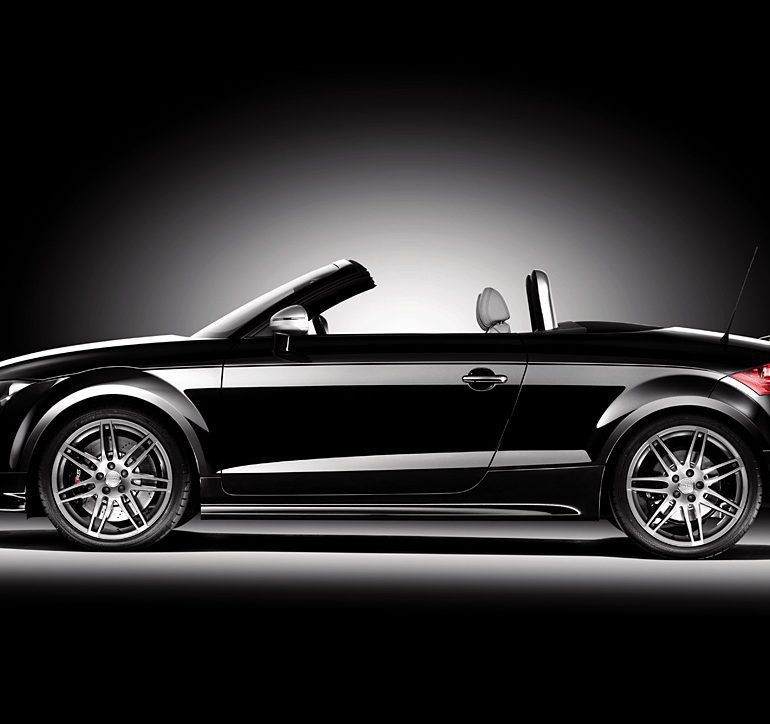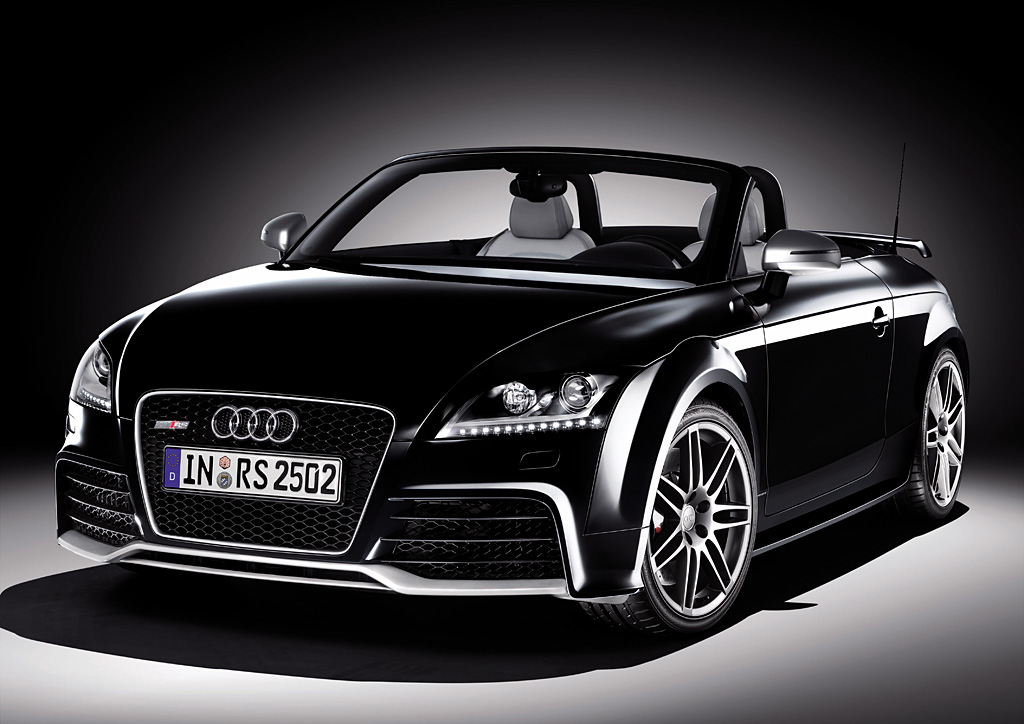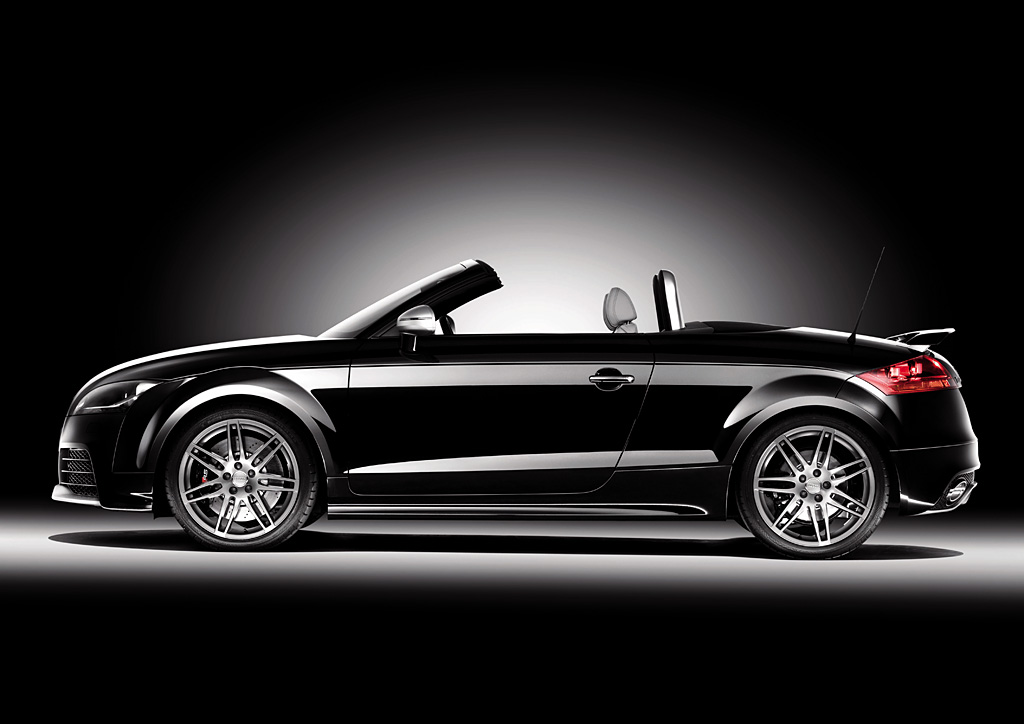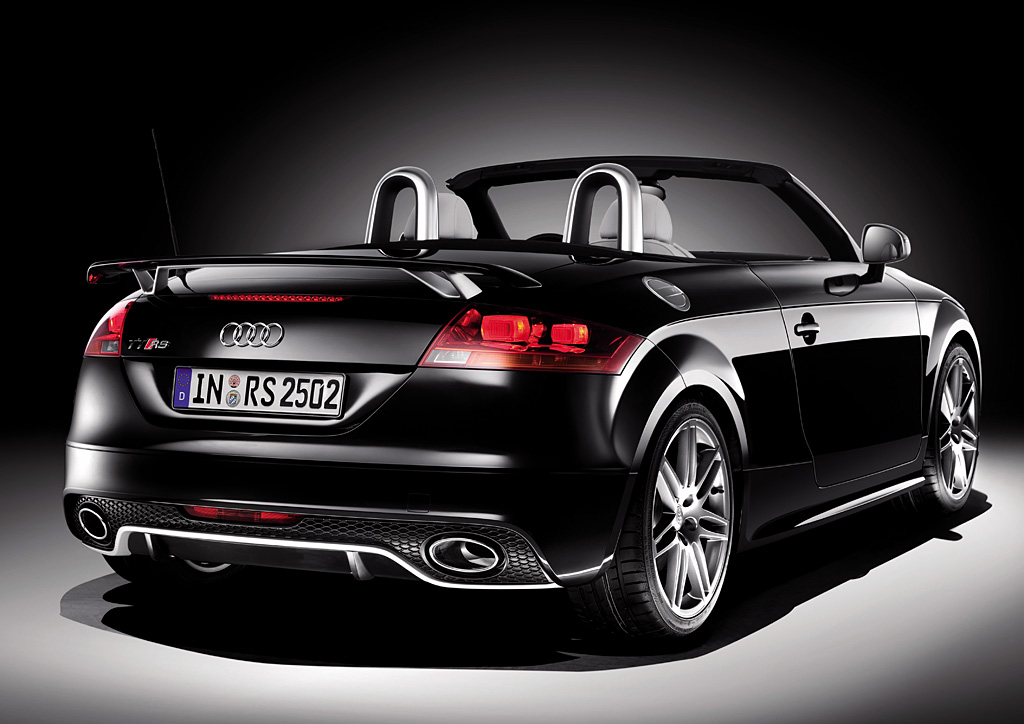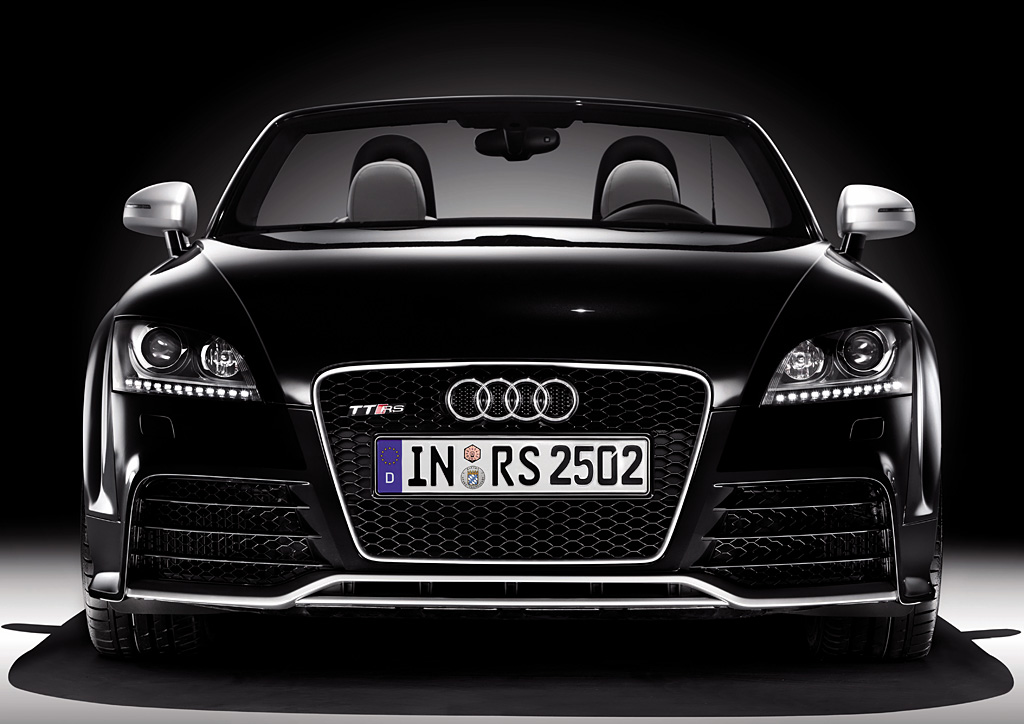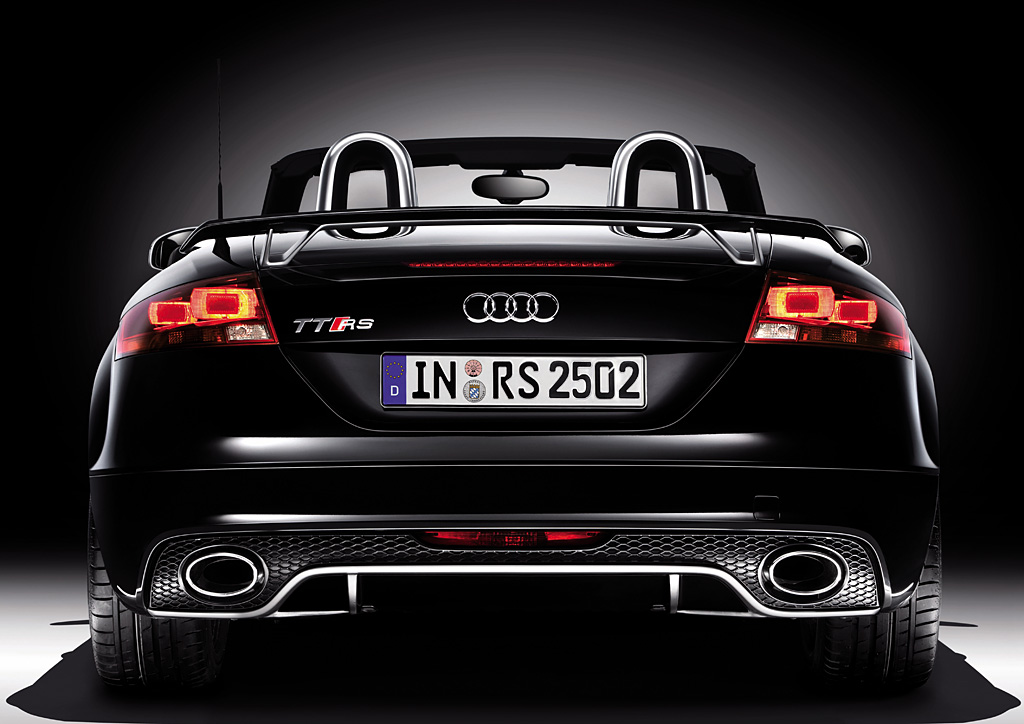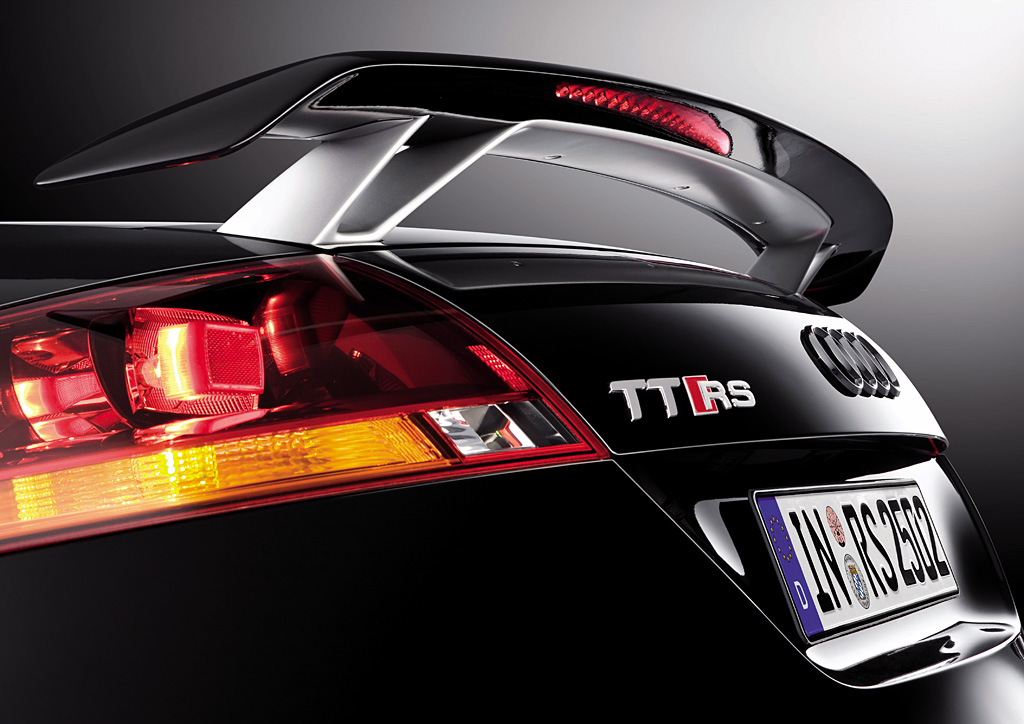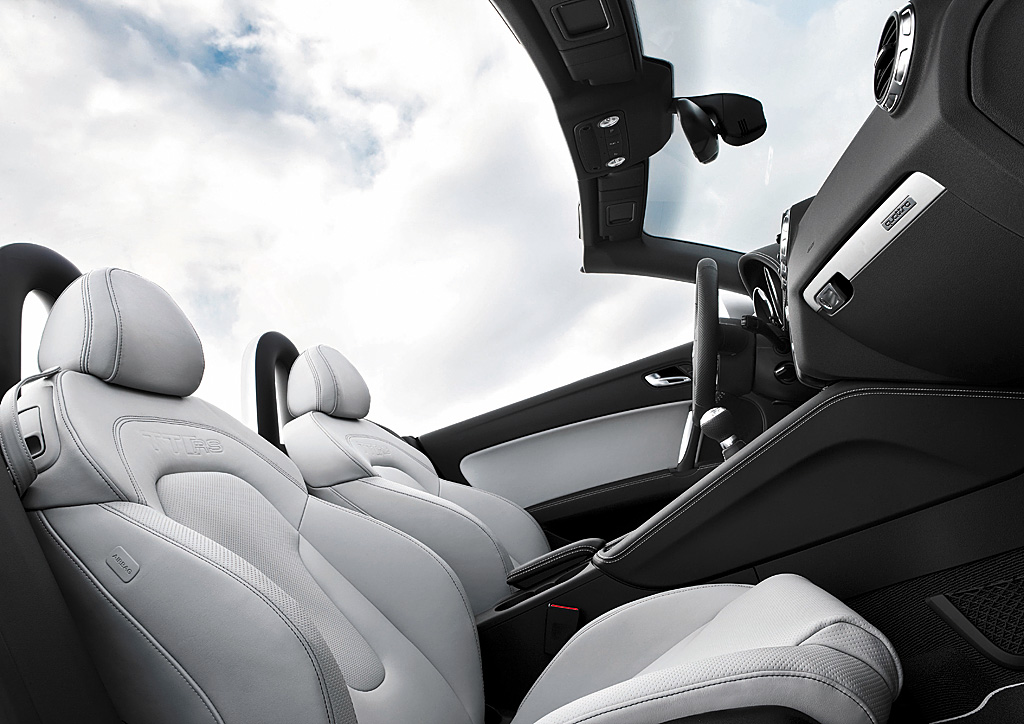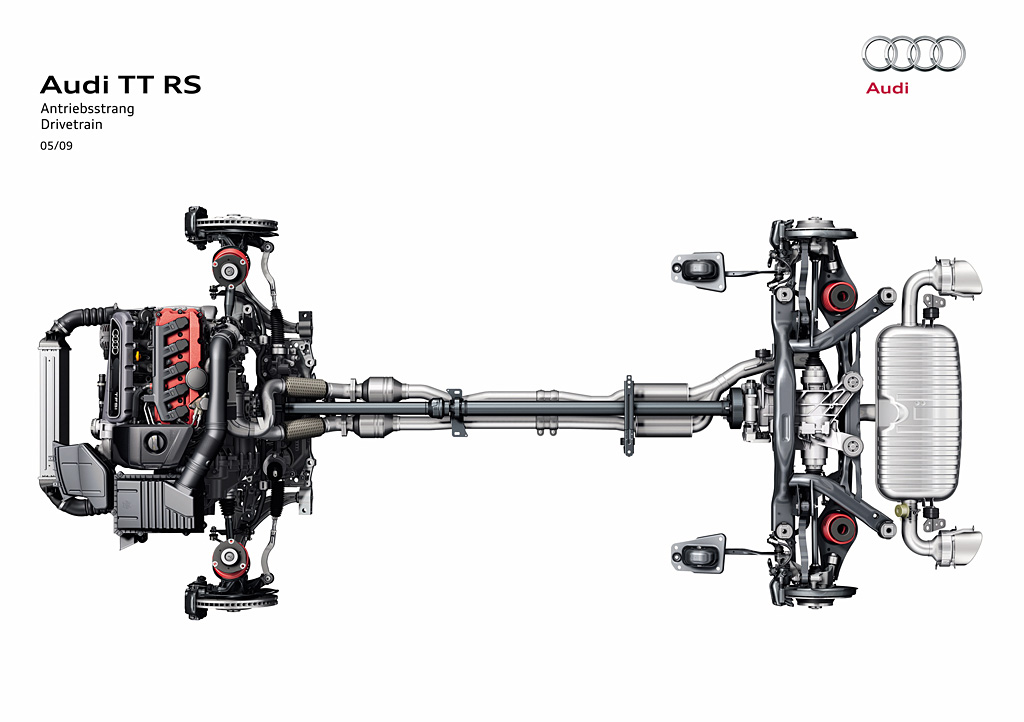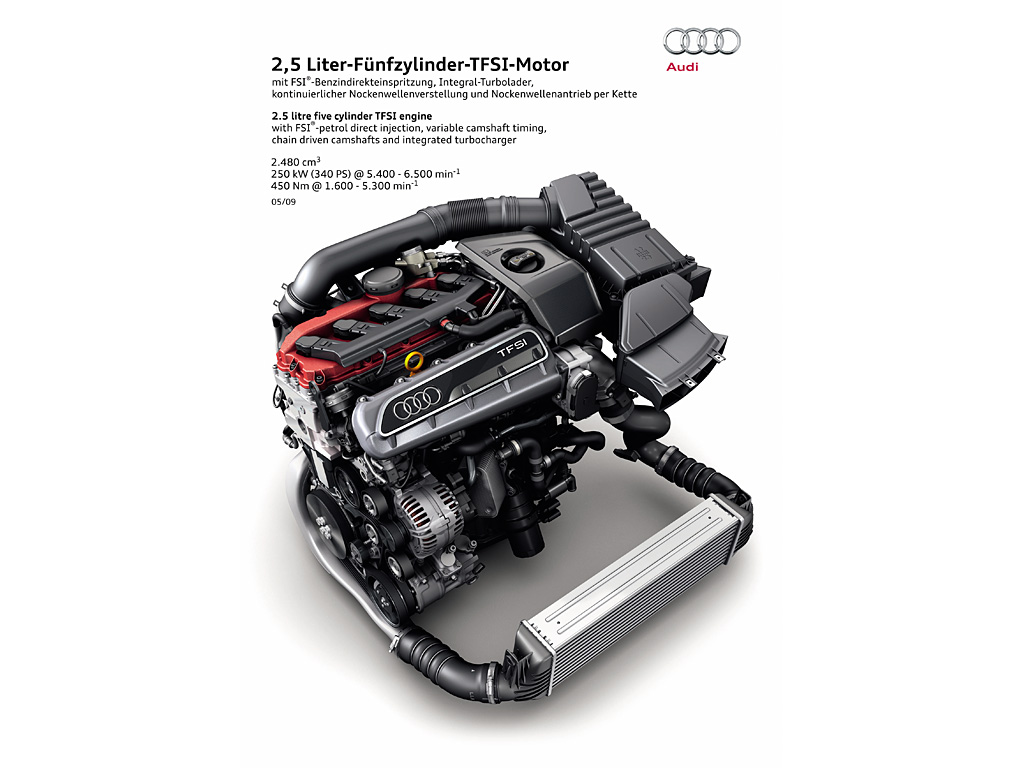2010 Audi TT RS Roadster
Dynamic design, enthralling performance and exemplary efficiency – the Audi TT, in both the Coupé and Roadster versions, is the very embodiment of a sports car. Now Audi is making the compact model series even more attractive. The design of the lightweight bodies made primarily of aluminum and the interior have been revised with great attention to detail. New to the lineup is a powerful and highly efficient four cylinder: The 2.0 TFSI develops 155 kW (211 hp), but is content in the TT Coupé with an average fuel consumption of just 6.6 liters per 100 kilometers (35.64 US mpg).
The TT Coupé and the TT Roadster already sport a fascinating and dynamic appearance. Now their design has been revised to be even more expressive. The powerful front bumper frames larger air inlets with three-dimensional edges. The fog lights are set in chrome rings. The lattice of the single-frame grille in high-gloss black and the optional xenon plus headlights have also been redesigned. Twelve white light-emitting diodes arranged in a straight line at the lower edge of the headlights serve as the daytime running lights.
At the rear of the car, the voluminous tailpipes of the exhaust system – the 2.0 TFSI features a dual exhaust – and the larger, flat black diffuser set accents. The TT Coupé and the TT Roadster have grown by nearly two centimeters (0.79 in) and now measure 4,187 millimeters (164.84 in) in length as a result of the updates. The width of 1,842 millimeters (6.04 ft) and the height of 1,352 millimeters (4.44 ft) and 1,357 millimeters (4.45 ft) for the Coupé and Roadster, respectively, remain unchanged.
A key factor for the groundbreaking efficiency and excellent driving dynamics of the TT is the body, which features hybrid Audi Space Frame technology (ASF). Lightweight aluminum is used at the front of the car back to the B-pillar, with steel panels used at the rear. The mix makes it possible to finely balance the axle loads and keep the overall weight extremely low.
The body of the Coupé weighs only 206 kilograms, with 140 kilograms of aluminum and 66 kilograms of steel. The TT 1.8 TFSI weighs a mere 1,240 kg (2,733.73 lb), a good 100 kilograms (220.46 lbs) less than its competitors.
The classic cloth top of the TT Roadster is a perfect complement to Audi’s lightweight construction principle. It contributes to a low center of gravity, fits perfectly into the design line and takes up little space when open. Audi offers the soft top in two variants. The manual version features a central latch for opening and closing the top. An electrohydraulic drive opens the optional fully-automatic top in just 12 seconds, even while driving at speeds up to 50 km/h (31.07 mph).
The interior of the TT features a sporty design, dynamic elegance and uncompromising fit and finish. Now the designers have added even more gloss. Accents are provided by new aluminum-look applications and rings, frames and strips in high-gloss black. The aluminum strip above the glove box door is now brushed gray. There are three interior colors from which to choose. The leather seat covers are specially treated to reduce thermal heating by as much as 20 degrees Celsius (68 Fahrenheit) when the TT is parked in the sun.
Drivetrain
Audi offers both the TT Coupé and the TT Roadster with three four-cylinder engines with turbocharging and direct fuel injection. The two TFSI gasoline engines and the TDI combine sporty performance with groundbreaking efficiency – their fuel consumption figures have been reduced by up to 14 percent. All three engines work with a recuperation system that recovers energy during braking and coasting phases.
New to the TT lineup is the 2.0 TFSI with 155 kW (211 hp) and 350 Nm of torque (258.15 lb-ft), the latter between 1,600 and 4,200 rpm. With a manual transmission, the turbocharged two-liter engine accelerates the Coupé from zero to 100 km/h (62.14 mph) in 6.1 seconds on its way to a top speed of 245 km/h (152.24 mph). Audi also offers the new 2.0 TFSI paired with the six-speed S tronic and quattro permanent all-wheel drive as an option. With this combination, the standard sprint takes only 5.6 seconds.
The Audi valvelift system AVS in the new 2.0 TFSI adjusts the lift of the exhaust valves in two stages, which increases power, torque and efficiency. Equipped with a manual transmission, the TT 2.0 TFSI consumes only 6.6 liters of fuel per 100 km (35.64 US mpg) in the European test cycle. It emits just 154 grams of CO2 per km (247.84 g/mile). Fuel consumption has improved by 1.1 liters/100 km over the previous model.
The TT engine lineup includes two other four-cylinder engines besides the new 2.0 TFSI. The 1.8 TFSI, available with a six-speed manual transmission and front-wheel drive, delivers 118 kW (160 hp) and 250 Nm of torque (184.39 lb-ft), the latter between 1,500 and 4,500 rpm. It launches the Coupé from a standing start to 100 km/h in 7.2 seconds, with a top speed of 226 km/h (140.43 mph).
It consumes 6.4 liters of fuel per 100 km (36.75 US mpg) on average, which corresponds to only 149 grams of CO2/km (239.79 g/mile).
The TT 2.0 TDI easily sets new standards when it comes to efficiency. The TT Coupé is content with just 5.3 liters of fuel per 100 km (44.38 US mpg) on average, which corresponds to only 139 grams of CO2/km (223.70 g/mile). With 125 kW (170 hp) and 350 Nm (258.15 lb-ft) of torque – the latter available between 1,750 and 2,500 rpm – the standard sprint takes 7.5 seconds and acceleration continues until a top speed of 226 km/h (140.43 mph) is reached. The two-liter TDI is paired with a manual transmission and quattro all-wheel drive.
A six-speed manual transmission transfers power to the wheels regardless of the engine. Audi also offers the S tronic dual clutch transmission for the new 2.0 TFSI. This transmission switches between its six gears extremely quickly with no perceptible interruption to the supply of power. The high-tech gearbox offers the driver both an automatic and manual mode. Manual shifts can be made using the optional paddles on the steering wheel.
The quattro permanent all-wheel drive system is available as an option for the 2.0 TFSI with the S tronic; it comes standard with the 2.0 TDI. Its hydraulic multi-plate clutch is electronically controlled. During normal driving, it sends most of the engine’s power to the front wheels, but can quickly transfer power to the rear wheels, if necessary.
Chassis
The front suspension of the TT features McPherson struts, with aluminum components used to keep the weight of the unsprung masses low. The power steering is direct, sensitive and thanks to its electromechanical drive, highly efficient. The trailing arms of the four-link rear suspension are relatively soft for better comfort. The connections to the three transverse links per wheel, on the other hand, are rigid in order to direct lateral forces into the body with precision.
Available as an option with all variants of the TT is the electronically controlled Audi magnetic ride shock absorber system, another high-tech feature.
A computer controls the adaptive damping. The two base characteristics are now more clearly differentiated from one another. In “Normal” mode, the movements of the TT Coupé and the TT Roadster are both agile and comfortable; in “Sport” mode, high damping forces largely suppress body motion.
Another option is available in addition to Audi magnetic ride – the Sport button. The driver can use it to adjust the characteristic of the gas pedal (with manual transmissions), the servo boost for the steering and the engine sound in two stages.
The range of wheels has also been reworked, and now features 14 variants.
The TT 1.8 TFSI, the 2.0 TDI and the 2.0 TFSI roll off the assembly line on 17-inch aluminum wheels with size 245/45 tires. The range of summer wheels extends all the way up to 9 J x 19 with 255/35 tires.
Equipment and trim
All versions of the TT Coupé and TT Roadster come with a wide array of standard equipment. Among the highlights are the “chorus” audio system, a driver information system and – in the TT Coupé– an automatic climate control system. Two navigation systems, a universal cellular phone preparation and the Bose Surround Sound system are available as options.
The onboard computer with efficiency program comes standard in the TT. It presents all consumption-relevant data on the central display, and gives tips for efficient driving. The gear-change indicator indicates the proper gear.
Another function indicates the energy consumption of the individual systems in the vehicle and how that influences fuel consumption.
Those who are fond of very special features will find a wide selection available in Color & Trim. It begins with the optional leather upholstery and includes four leather packages, an application package and two S line packages – the S line exterior package and the S line sport package. The updated TT Coupé and the TT Roadster will debut on the German market this summer with only minimal changes in price. The 1.8 TFSI will be available from €30,200.
The Audi TTS and the Audi TT RS
The Audi TTS, both in Coupé and Roadster body styles, combine enthralling sportiness with amazing comfort. Its two-liter TFSI delivers 200 kW (272 hp) and 350 Nm (258.15 lb-ft) of torque to the quattro permanent all-wheel drive. It accelerates the TTS Coupé with the optional S tronic from zero to 100 km/h (62.14 mph) in 5.2 seconds, up to a top speed of 250 km/h (155.34 mph). With the S tronic, average fuel consumption is only 7.7 liters of fuel per 100 km (30.55 US mpg).
The TTS comes standard with the Audi magnetic ride adaptive shock absorber technology, the Sport button and a particularly powerful brake system. Visual cues to its identity are provided by 18-inch wheels, a new grille and chrome air inlets.
The spearhead of the TT model series is the TT RS, which is likewise available as a Coupé or a Roadster. Its turbocharged, inline 5-cylinder engine draws 250 kW (340 hp) of power from 2.5 liters of displacement, with 450 Nm (331.90 lb ft) of torque available between 1,600 and 5,300 rpm. Average fuel consumption is just 9.2 liters of fuel per 100 km (25.57 US mpg), however. A sound flap in the exhaust system further intensifies the throaty sound. The TT RS Coupé rockets from 0 to 100 km/h (0 to 62.14 mph) in 4.6 seconds; quattro GmbH will raise the top speed from 250 to 280 km/h (155.34 to 173.98 mph) upon request. The TT RS also comes standard with quattro permanent all-wheel drive, of course.
Beginning this fall, the S tronic will also be available for the TT RS – in a new, beefed up version with seven speeds. Equipped with the high-end transmission, the Coupé catapults from zero to 100 km/h (62.14 mph) in 4.4 seconds. Distinctive design details, 18-inch wheels and a high-performance brake system are standard with the TT RS.
Story by Audi AG
In Detail
| type | Series Production Car |
| released at | 2009 Geneva Auto Show |
| built at | Győr, Hungary, Other |
| coachbuilder | quattro GmbH |
| engine | 2.5 R5 20v TFSI Inline-5 |
| position | Front, Transverse |
| aspiration | Turbocharger |
| ignition | Electronic, Coil on Plug |
| block material | Cast Iron w/Aluminium Alloy Cylinder Head |
| valvetrain | 4 Valves per Cyl |
| fuel feed | Direct Gasoline Injection |
| displacement | 2480 cc / 151.34 in³ |
| bore | 82.5 mm / 3.2 in |
| stroke | 92.8 mm / 3.7 in |
| compression | 10.0:1 |
| power | 250 kw / 335.3 bhp @ 5400 rpm |
| specific output | 135.2 bhp per litre |
| torque | 450 nm / 331.9 ft lbs @ 1600 rpm |
| redline | 7000 |
| body / frame | Unitary Aluminum & Steel Monocoque |
| driven wheels | AWD |
| front tires | 255/35R-19 96Y Toyo Proxes |
| rear tires | 255/35R-19 96Y Toyo Proxes |
| front brakes | Ventilated Discs w/4-Piston Calipers |
| rear brakes | Ventilated Discs w/Single-Piston Calipers |
| front wheels | F 48.3 x 22.9 cm / 19 x 9 in |
| rear wheels | R 48.3 x 22.9 cm / 19 x 9 in |
| steering | Rack & Pinion |
| f suspension | MacPherson Struts |
| r suspension | MacPherson Struts |
| wheelbase | 2468 mm / 97.2 in |
| front track | 1555 mm / 61.2 in |
| rear track | 1546 mm / 60.9 in |
| length | 4198 mm / 165.3 in |
| width | 1842 mm / 72.5 in |
| height | 1350 mm / 53.1 in |
| transmission | 6-Speed Manual |
| gear ratios | 3.57:1, 2.16:1, 1.89:1, 1.43:1, 1.16:1, 0.97:1 |


